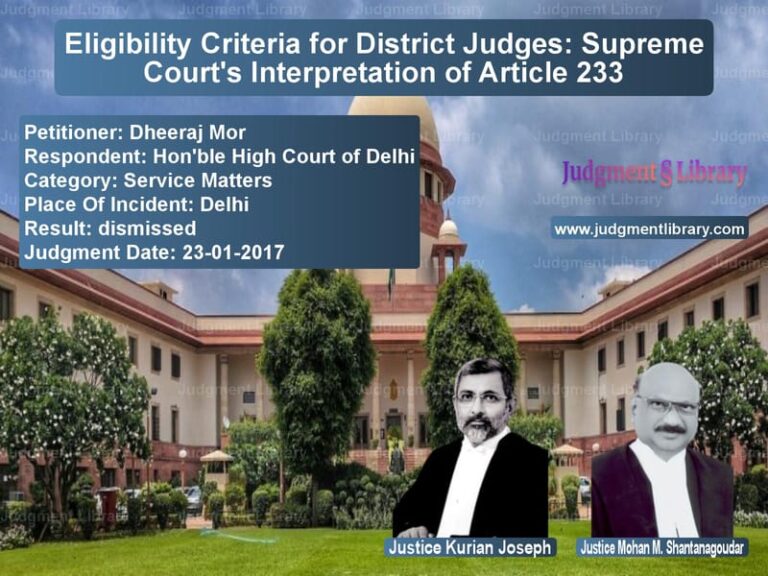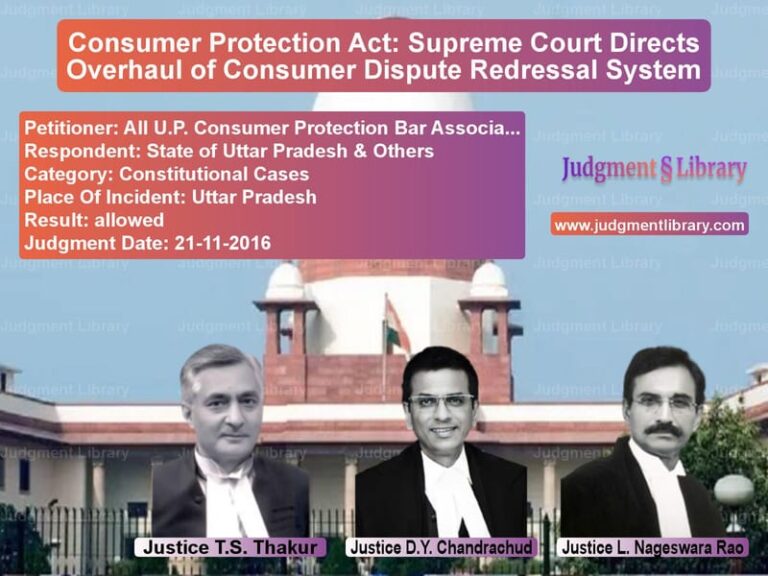Maintenance in Divorce: Supreme Court Reduces Interim Alimony Under Hindu Marriage Act
The case of Manish Jain v. Akanksha Jain is a landmark ruling in matrimonial disputes concerning maintenance pendente lite (interim maintenance during legal proceedings). The dispute arose when the appellant-husband, Manish Jain, challenged a Delhi High Court order that awarded Rs. 60,000 per month as interim maintenance to the respondent-wife, Akanksha Jain, under Section 24 of the Hindu Marriage Act, 1955. The Supreme Court had to determine whether the High Court’s decision was reasonable and justified based on the financial conditions of both parties.
After analyzing the case, the Supreme Court reduced the maintenance amount to Rs. 25,000 per month, emphasizing that maintenance should balance the financial needs of the dependent spouse with the paying spouse’s ability to provide support.
Background of the Case
The dispute stemmed from a divorce petition filed by the appellant-husband in 2007 under the Hindu Marriage Act, citing cruelty as the reason for seeking dissolution of the marriage. Subsequently, the respondent-wife initiated multiple legal proceedings, including:
- A petition under the Protection of Women from Domestic Violence Act, 2005 (D.V. Act), seeking protection and maintenance.
- A criminal complaint under Section 498-A and Section 406 of the Indian Penal Code (IPC), alleging cruelty and dowry harassment.
- A maintenance petition under Section 125 of the Code of Criminal Procedure (CrPC), seeking financial support.
Legal Proceedings and Interim Orders
The respondent-wife claimed she was unemployed and entirely dependent on others for financial support. She sought Rs. 4,00,000 per month in maintenance, along with Rs. 80,000 for litigation expenses. The trial court dismissed her claim, stating that she was an educated woman with professional qualifications in fashion design and had the potential to earn a living.
Dissatisfied with this decision, the wife approached the Delhi High Court, which awarded her Rs. 60,000 per month in maintenance.
Appellant’s Arguments Before the Supreme Court
The appellant-husband challenged the High Court’s decision, arguing:
- The respondent-wife had misrepresented her employment status and financial independence.
- The trial court had correctly determined that the wife was capable of earning a livelihood.
- The High Court’s order of Rs. 60,000 per month was excessive and beyond his financial capacity.
- He was already paying Rs. 10,000 per month under the D.V. Act and had returned assets, including a Toyota Corolla and dowry items.
Respondent’s Counterarguments
The respondent-wife defended the High Court’s decision, arguing:
- She had no stable income and required maintenance to maintain the standard of living she had during the marriage.
- The appellant-husband’s family owned multiple properties and had a thriving business, making him financially capable of paying maintenance.
- The trial court had failed to consider her financial hardships.
Supreme Court’s Judgment
The Supreme Court, comprising Justices Kurian Joseph and R. Banumathi, carefully examined the financial status of both parties and observed:
- Under Section 24 of the Hindu Marriage Act, maintenance should ensure a dependent spouse maintains a similar standard of living as enjoyed during the marriage.
- The High Court’s assessment of Rs. 60,000 per month was excessive given the appellant’s financial constraints.
- Maintenance orders must consider the paying spouse’s ability to provide support without undue financial hardship.
The Supreme Court ruled:
- The High Court’s order was modified, reducing the maintenance amount to Rs. 25,000 per month.
- The appellant-husband was directed to clear arrears of maintenance from February 1, 2012.
- The appellant-husband must continue paying Rs. 25,000 per month until the divorce petition is resolved.
Key Legal Takeaways
This ruling reinforces several important legal principles regarding maintenance in divorce cases:
- Maintenance Should Be Fair and Reasonable: Courts must balance the dependent spouse’s needs with the paying spouse’s financial capacity.
- Accurate Financial Disclosures Are Crucial: Courts rely on honest financial disclosures from both parties when determining maintenance.
- Maintenance Orders Can Be Revised: Interim maintenance is temporary and can be adjusted based on financial circumstances.
Implications for Future Matrimonial Cases
This judgment sets a precedent for future maintenance disputes by establishing that:
- Spouses must provide full and accurate details of their financial status.
- Maintenance should not create undue financial hardship for the paying spouse.
- Court orders for maintenance can be reviewed if circumstances change.
Conclusion
The Supreme Court’s decision in Manish Jain v. Akanksha Jain provides a balanced approach to maintenance in divorce proceedings. By reducing the maintenance amount while ensuring financial security for the wife, the judgment upholds fairness and judicial discretion in matrimonial disputes.
Don’t miss out on the full details! Download the complete judgment in PDF format below and gain valuable insights instantly!
Download Judgment: Manish Jain vs Akanksha Jain Supreme Court of India Judgment Dated 30-03-2017.pdf
Direct Downlaod Judgment: Direct downlaod this Judgment
See all petitions in Alimony and Maintenance
See all petitions in Child Custody
See all petitions in Judgment by Kurian Joseph
See all petitions in Judgment by R. Banumathi
See all petitions in allowed
See all petitions in supreme court of India judgments March 2017
See all petitions in 2017 judgments
See all posts in Divorce Cases Category
See all allowed petitions in Divorce Cases Category
See all Dismissed petitions in Divorce Cases Category
See all partially allowed petitions in Divorce Cases Category







